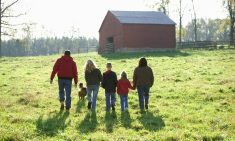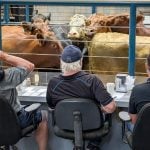The questions may be the same, but the tone has changed, says Kent Gulash, longtime farm family coach from Saskatoon. When families meet their transition advisors these days, they’re coming from a different place.
“That’s because the dynamics around the value of farms have changed,” Gulash says. There’s trepidation now, he explains. Will the farm’s successors be able to hold onto the value that has been built up?
The scale has changed, and today the objective is to see the farm as a business and to truly appreciate the value of it as a whole.
Read Also

Part 4: Financial disagreements between farm siblings
A six-part series that looks at the challenges sibling conflict can have on the farm business and family business relationships.
More and more often, the big driver of farm transition questions these days is the value of farms, especially as land prices continue at unprecedented levels all across Canada. That’s promoting farm family coaches like Gulash and Manitoba’s Elaine Froese to have more conversations about the evaluation of the farm.
Froese is blunt: “As land prices go up, it’s causing a lot of greed and entitlement among different family members,” she says. “We need to lock in the evaluation of the farm as a stake in the ground … The whole conversation around the expectations about transfer of land and the value of land is a huge one.”
Financial considerations take priority
In reality, a farm asset like land is only worth its value in cash if it’s sold. No farm can operate without land to grow its crops and provide feed for livestock and it’s also a tool for leveraging debt and operating funds. But it’s not always easy to make non-farming successors understand that equation when they are dazzled by the dollar signs attached to the land.
“If the intention is for this land to be used for the next generation, you want to flip your mindset to being a steward of that land because you’re keeping, creating and crafting it for the next generation and the one beyond, and you need access to land to farm,” Froese says. “You don’t necessarily need to own it, but the problem is it’s getting harder to do both. People who don’t own land are having a much more difficult time getting access to land at rates that they can afford to cash-flow.”
Often, non-farming siblings have a sense of entitlement about what they believe their parents’ estate owes them but Froese answers those kinds of questions with one of her own.
“Where is it written that I have to give you this land, or where is it written that because you’re one of my four children you get 25 per cent of the land? Where did you get that idea?” she asks.
“This is 2022, your brother or sister who wants to farm will not be buying this land, they can’t afford it. The transition plan is that it will roll to whoever is the business owner of the farm.”
The other question
Another trend that’s surfacing in transition conversations starts with the fact that farmers have not been paying enough attention to their income streams as they age, which is making their retirement and the transition process much harder.
“The other thing we are pushing farmers towards, that 10 years ago they wouldn’t see a need for, is to get financial planning help,” Froese says. “I want every farmer, of all generations, to have a personal fee-for-service financial planner to let them know that their income streams are secure now and for the next 25 to 30 years.”
What’s holding many farmers of the older generation back from getting the financial advice they need is simply a scarcity mindset, adds Froese.
“Related to the high value of land and the net worth of farmers is that many older farmers do not have the ability to have a wealth mindset,” she continues. “They are stuck in scarcity thinking, and they don’t know how to navigate philanthropy, charity and celebrating what good has been brought to them in their farm. They are hanging on tight because they’re afraid of failure of the next generation.
“But they didn’t create all that wealth, inflation has. It also creates fear in people because they don’t have healthy money scripts.”
Parachutes?
With these challenges, Froese and her colleagues see an increase in people seeking therapy and using conflict resolution and personality indicator tools.
“I think that’s an amazingly good thing,” Froese says. “I’ve actually had therapists join me in my family meetings. Sometimes we’re working in parallel, or sometimes I step aside and let them work on the conflict communication family dynamic first.”
Thankfully, mental health is no longer the taboo subject of yesteryear and in agriculture there is a lot more openness about the struggles that farm families go through, but there is still a lot of stress due to an enduring culture of workaholism on the farm that isn’t attractive to a new generation with different priorities for their lives.
“People are still living under scripts that aren’t working for them anymore, like, if I just work harder, this will all work out, then they’re burning up or they’re driving people away because they’re not being reasonable with what the expectations are of the next generation, or how the next generation wants to parent, or how the next generation wants to work,” Froese says.
“I call that living an intentional life, and some people just aren’t paying attention to living the life they’ve always wanted. They don’t think they have a choice and they do, but they’re not paying attention.”
Farming used to pride itself on a low divorce rate but that’s changed in recent years, as has the tendency for people to divorce later in life and after more years of marriage. In March 2022, Statistics Canada reported that although divorce rates generally had declined over the past 50 years, the average age of people divorcing is now around 46 compared to 36 in 1980.
There was also a 26 per cent rise in so called “grey divorces” between 1991 and 2006 and the numbers remain stable for that age category today. In 1980, the average length of marriage for divorced people was about 23 years and by 2020 that had risen to 30 years.
It’s not only sad and emotionally devastating at a personal level, but the damage to the farm can be irreparable.
“‘Every front door looks beautiful,’ which is a lovely Irish proverb. But you have no idea what’s really going on behind it,” Froese says. “Every farm that touches ours has had a divorce. One neighbour had been married for 32 years and when his wife decided to go off to Alberta and create a new life;, he was forced to sell all his land.”
Can’t live on promises
Another thorny issue in today’s world is compensation, which is not just an issue of fairness but of security, especially in an environment where prices for everything have hugely inflated over the past few years.
“We have young college-educated people coming back to the farm, and they are not being fairly compensated, and they are there based on the parents and the promise, ‘Trust me, someday this will all be yours’,” Froese says. “I would say that is the biggest lie in agriculture, and I tell people who are hearing this to run in the other direction as quickly as they can, and get into a joint venture with someone who actually values their skill and ability.”
Mentorship from one generation to the next is sorely needed in farm transition, especially when it comes to transferring knowledge and experience that is part of successful management, but that mentorship has to be done in a compassionate way, Froese says.
“If you don’t have a teaching style or a learning friend to be a mentor to your successor, then you need to help find good mentors for them,” Froese says.
They could join a marketing club or a peer network, which are much more common in farming today than they were even 10 years ago. Social media, like Twitter, is another trend that has a lot of positives to help the next generation connect and learn from each other.
This exchange of information is driving another positive trend of farmers collaborating with each other, whether it’s to buy land or share ideas and information. They are also working harder to increase the productivity of the land they already have, by adopting practices like regenerative farming or improving drainage or introducing irrigation systems.
Ready to walk away
But the reality is things don’t always work out, and today’s younger generation might just be more willing to walk away because they understand they have other options, which is sometimes the best thing for the farm and for the outgoing generation too.
“It comes back to that stake in the ground; when is the tipping point of having what Dr. Henry Cloud calls a ‘necessary ending’?”
Froese did three ranching conferences in the U.S. this year and came across a powerful story that illustrates the point. A woman told how, when she and her husband gave their succession plan proposal to their father at a facilitated meeting with a mediator, he grabbed the paper, threw it on the floor and said, “This is bull.”
The couple walked out of the meeting and down the road to a ranch that they had purchased as young ranchers when it became available. All of the equity that they had in their father’s ranch was moveable like skid steers, panels and animals because they knew that if he was going to continue to be nasty and uncollaborative that they might need to leave.
“I have given that woman’s phone number to other ranchers, because when I asked her if she was okay with that she said ‘Absolutely, because I want people to know that when things don’t work out, they have options.’” Froese says.
The age factor
Froese and her team have also seen a shift in the older generation age that they believe farmers generally should be aware of.
“Based on what we have seen, in the 60 to 65 age range there’s still good flexibility for planning, but there seems to be a shift in mindset at age 75 where people start to pull back in and it makes it more challenging to let go,” Gulash says. “That provides a sense of urgency for paying attention to how old the founders are. Get things agreed to and written down as early as possible.”
Froese believes that age is something more farm families need to pay special attention to because the journey through farm transition is essentially a lifelong journey, and there are going to be different priorities at different stages of people’s lives. They shouldn’t miss the opportunity to address them as they arise or the moment may be lost forever and cause more issues down the road.
“A person’s 30s are about mastering success. Their 40s are about having control of their destiny. So, if they are approaching 40 on the farm and they still have no equity, control or management role, they are getting angry.
“They get to their 50s and the parents are still writing all the cheques. They haven’t talked to their accountant about having a facilitated meeting to open up the books. They aren’t having quarterly reviews. They haven’t spoken to lawyer about drawing up a shareholder’s agreement. Why? Because they are scared if they tick their parents off, they will get nothing, but they might get nothing anyway because they are not getting things in writing.”
3 Ageless Questions Before You Start
For the family farm to transition successfully, today’s farmers need to learn to challenge the existing culture of agriculture and be open to a whole new mindset, says farm family coach Elaine Froese.
“You need to have the attitude that we’re all in this together and we’re going to make decisions together,” Froese says, drawing upon her years of coaching farm families and also on personal experience, as she and her husband are currently transitioning their own family farm to the next generation.
Froese sees three basic questions that farm families must answer to get the process underway and set themselves up for a successful farm transition.
1. What do you believe?
In agriculture, it’s the culture that holds the farm together, Froese says. So, identifying what that culture is, and the values that each family member expects to uphold is the very foundation that the farm has been built on and that will be its road map for the future.
“The glue that holds our family farm together is our value system, what we believe to be true,” Froese says. “We believe in honestly, transparency, integrity, teamwork and challenge.”
2. How do you behave?
Respect always must be part of a successful farm culture, Froese adds.
“When there is drama or tension, how you behave towards each other is so important,” she says. “People with low emotional intelligence are nasty and toxic, and they are decreasing the profitability of their farm because distracted management is costing them money. Unresolved conflict is costing them money because it’s creating accidents, damage to machinery, it might even create death and suicide. There’s all kinds of stuff happening because of it.”
3. How do you make decisions?
Decision-making is where the glue can come unstuck, Froese says.
“In order to make good decisions, you have to have robust conversations,” she says. “In order to have robust conversations, you have to be clear about what you’re thinking, feeling, needing and wanting. With a lot of farmers I’ll say, ‘What do you want?’ And they’ll say, ‘I don’t know what I want.’ That’s where we have to start.”
According to research into neurological linguistics, farmers have what is called “away from” behaviour, not “towards.” When someone sets a goal, that’s towards behaviour, but farmers are fixers and problem-solvers.
“Farmers are always wanting to avoid mistakes, avoid weeds, avoid market crashes and so on,” Froese says. “The way they’re wired is to fix things. What they aren’t aware of is the communication brokenness. As coaches, we try to help people understand what everyone in the family is thinking, feeling, needing and wanting, because once you get clear on that, transition planning doesn’t have to be hard.”
















